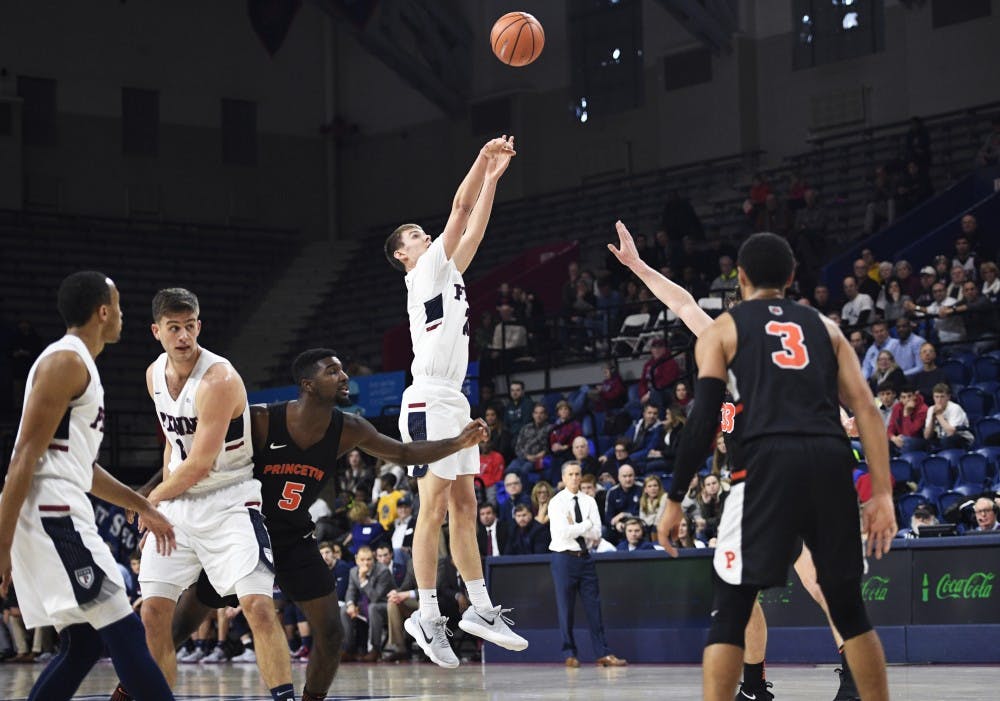
Sophomore guard Ryan Betley led the way for the Quakers against Princeton with 21 points, including 19 in the first half.
Credit: Chase SuttonIt started with a whimper, but Penn-Princeton men's basketball didn’t stay quiet for very long.
The much anticipated – and once delayed – Ivy League season opener stalled out the gate as neither team seemed able to land a punch: the first points came almost three minutes into the game. Once that was out of the way, the two archrivals treated those in attendance with one of the most exciting regular season games in recent memory: a 76-70 Penn win over defending conference champion Princeton.
Princeton (7-8, 0-1 Ivy) drew first blood to end the scoreless stretch, but Penn (10-5, 1-0) quickly responded. The Tigers' largest lead occurred four minutes into the game at 5-0. The Quakers took a 9-7 lead a minute later and never relinquished it, making seven of their next nine shots after missing their first five.
Penn sophomore Ryan Betley was easily the best player on the court in the first twenty minutes. The guard didn't sit for a single second of the game and scored 19 first-half points, finishing with a game-high 21. Betley finished the game shooting 73 percent from the floor, including a perfect 3-for-3 from beyond the arc.
As electric of a first half Betley had, his final twenty minutes were a lot quieter. Princeton guard Amir Bell locked onto Betley and didn’t allow him many looks. Instead of forcing the ball to him, Penn was content to look elsewhere – particularly to junior center Max Rothschild.
“Ryan was hot; most of the stuff was off the double in the post in the first half, and they were scrambling. He took advantage of it,” Penn coach Steve Donahue said. “They didn’t double in the second half, and I thought we hurt them in the low block with Max and AJ [Brodeur] and then cuts off of that.”
Penn’s balance is perhaps its biggest strength. The Quakers' two bigs – sophomore forward AJ Brodeur and a much-improved Rothschild – demand extra attention. When teams do commit numbers down low however, the rest of the floor opens up for the guards. Penn forces teams to pick their poison: either defend Betley and the guards and risk a big game from the bigs, or focus on stopping Brodeur and Rothschild and risk the opposite.
“I think that’s a strength of our team. We never say who we’re going to go to or who’s our go-to guy,” Donahue said. “We’re one of the few teams in the country that – nobody in our team has more than a 22 percent usage rate at the end of the possession. I think that’s a good thing.”
Early in the season, Rothschild did not have as much success alleviating pressure from Betley and Brodeur. Now that he has established himself as a legitimate offensive threat, with both his size and increasingly with his vision, the Quakers have become a very scary team to play against.
It’s rare that two teams shoot as well as Penn and Princeton did. The Quakers shot 52 percent from the floor while the Tigers made 45 percent of their shots. Both teams shot above 53 percent in the second half. Those types of numbers would make it seem like both teams struggled defensively, but that could not be further from the truth.
Both teams limited each other to mostly contested, well-defended shots. They just kept making them.
“I thought that was a well-played basketball game, very well fought,” Donahue said. “For me, limiting them to seven assists is a big number, because it means we’re guarding our man, not over-helping. … So I thought we guarded them, we didn’t over-help, and for the most part I didn’t think we fouled.”
Rothschild in particular shined defensively, helping limit Princeton’s Myles Stephens, one of the Tigers’ best scorers, to eight points, including just two in the second half. The junior also supplied five assists, bringing his season total up to 31 through 15 games, a solid number for a big man.
“I thought he was terrific,” Princeton coach Mitch Henderson said. “He made big plays, he was calm, he played like a veteran in the league. I thought he was a big part of it.”
Up two with under a minute to go and the ball, the Quakers needed a bucket to make it a two-possession game. With Princeton forced to respect every shooter on the court, Penn was able to get the ball to Brodeur in a one-on-one situation. Brodeur doesn't miss many of those — and he didn't on Saturday afternoon, scoring a clutch bucket to help ice Penn's first win over Princeton in nine tries.
The game might have started with a whimper, but Penn’s Ivy League season certainly started with a bang.
The Daily Pennsylvanian is an independent, student-run newspaper. Please consider making a donation to support the coverage that shapes the University. Your generosity ensures a future of strong journalism at Penn.
Donate







